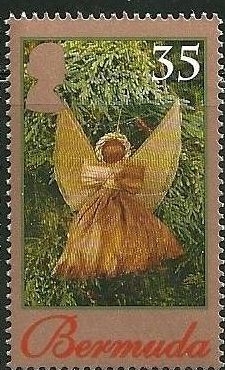Stamp: Angel (Bermuda 2009)
Angel (Bermuda 2009)
24 September (Bermuda ) within release Christmas tree ornaments goes into circulation Stamp Angel face value 35 Bermudian cent
| Stamp Angel in catalogues | |
|---|---|
| Stamp Number: | Sn:BM 998 |
Stamp is square format.
Watermark 406Also in the issue Christmas tree ornaments:
- Stamp - Basket face value 30;
- Stamp - Angel face value 35;
- Stamp - Basket, different face value 70;
- Stamp - Angel, different face value 85;
|
Data entry completed
53%
|
|
|---|---|
| Stamp Angel in digits | |
| Country: | Bermuda |
| Date: | 2009-09-24 |
| Perforation: | 14 x 13¾ |
| Emission: | Commemorative |
| Format: | Stamp |
| Face Value: | 35 Bermudian cent |
Stamp Angel it reflects the thematic directions:
Christmas or Christmas Day (Old English: Crīstesmæsse, meaning "Christ's Mass") is an annual festival commemorating the birth of Jesus Christ, observed most commonly on December 25 as a religious and cultural celebration among billions of people around the world. A feast central to the Christian liturgical year, it is prepared for by the season of Advent or the Nativity Fast and initiates the season of Christmastide, which historically in the West lasts twelve days and culminates on Twelfth Night; in some traditions, Christmastide includes an Octave. The traditional Christmas narrative, the Nativity of Jesus, delineated in the New Testament says that Jesus was born in Bethlehem, in accordance with messianic prophecies; when Joseph and Mary arrived in the city, the inn had no room and so they were offered a stable where the Christ Child was soon born, with angels proclaiming this news to shepherds who then disseminated the message furthermore. Christmas Day is a public holiday in many of the world's nations, is celebrated religiously by the vast majority of Christians, as well as culturally by a number of non-Christian people, and is an integral part of the holiday season, while some Christian groups reject the celebration. In several countries, celebrating Christmas Eve on December 24 has the main focus rather than December 25, with gift-giving and sharing a traditional meal with the family.
A craft or trade is a pastime or an occupation that requires particular skills and knowledge of skilled work. In a historical sense, particularly the Middle Ages and earlier, the term is usually applied to people occupied in small scale production of goods, or their maintenance, for example by tinkers. The traditional term craftsman is nowadays often replaced by artisan and by craftsperson.


